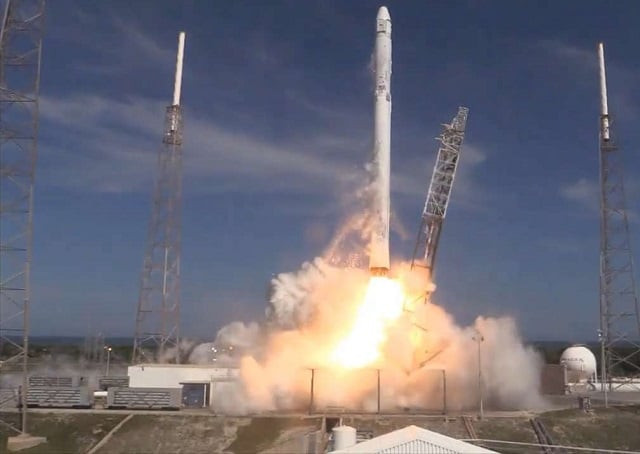SpaceX launches cargo, but fails to land rocket
The mission was its 16th mission for NASA as part of a long-term contract to ferry supplies to space

A SpaceX Falcon 9 rocket and Dragon capsule blasted off from Cape Canaveral Air Force Station at 4:10 pm.
PHOTO: SPACEX
"We have had a great liftoff," said SpaceX commentator John Insprucker, as the Falcon 9 rocket soared into the sunny, blue sky over Cape Canaveral, Florida at 1:16 pm [1816 GMT], carrying 5,600 pounds [2,500 kilograms] of gear.
The mission was SpaceX's 16th mission for NASA as part of a long-term contract to ferry supplies to space.
US regulator approves SpaceX plan for broadband satellite services
The Dragon cargo ship successfully made it to orbit, which was the primary goal of the launch.
But the tall portion of the rocket missed its goal of securing an upright landing on the solid ground at Cape Canaveral's Landing Zone 1.
After separating from the second stage, and firing its engines to return to Earth, a video camera on board showed the first stage spinning.
"Grid fin hydraulic pump stalled, so Falcon landed just out to sea," CEO Elon Musk said on Twitter.
"Appears to be undamaged and is transmitting data. Recovery ship dispatched."
Later, Musk posted the full video from on board the booster, showing the rocket spiral, then stabilize, then crash sideways into the water.
"Engines stabilised rocket spin just in time, enabling an intact landing in water! Ships en route to rescue Falcon," he wrote.
It was the first time SpaceX ever failed to land a booster on solid ground, following a string of 12 straight successes.
Ocean platform landings have proven a bit trickier, but SpaceX has managed to stick the landing, whether on land or sea, 32 times in all.
Elon Musk deletes Facebook pages for Tesla, SpaceX
The effort is aimed at reducing the cost of launches by re-using expensive components, instead of jettisoning them in the ocean after each mission.
The rocket was initially meant to take off Tuesday but was delayed for a day after engineers discovered moldy mouse food in one of the science investigations designed to study the effect of microgravity on the immune system.
The bad food was replaced ahead of Wednesday's launch.
Other experiments among the more than 250 on board include a new kind of mustard green lettuce that astronauts will grow in space.
The Dragon space capsule that flew on Wednesday was used once before, on a supply mission in February 2017.
It should arrive at the space station on Saturday.


















COMMENTS
Comments are moderated and generally will be posted if they are on-topic and not abusive.
For more information, please see our Comments FAQ